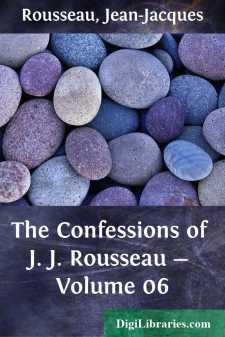Categories
- Antiques & Collectibles 13
- Architecture 36
- Art 48
- Bibles 22
- Biography & Autobiography 813
- Body, Mind & Spirit 142
- Business & Economics 28
- Children's Books 17
- Children's Fiction 14
- Computers 4
- Cooking 94
- Crafts & Hobbies 4
- Drama 346
- Education 46
- Family & Relationships 57
- Fiction 11829
- Games 19
- Gardening 17
- Health & Fitness 34
- History 1377
- House & Home 1
- Humor 147
- Juvenile Fiction 1873
- Juvenile Nonfiction 202
- Language Arts & Disciplines 88
- Law 16
- Literary Collections 686
- Literary Criticism 179
- Mathematics 13
- Medical 41
- Music 40
- Nature 179
- Non-Classifiable 1768
- Performing Arts 7
- Periodicals 1453
- Philosophy 64
- Photography 2
- Poetry 896
- Political Science 203
- Psychology 42
- Reference 154
- Religion 513
- Science 126
- Self-Help 84
- Social Science 81
- Sports & Recreation 34
- Study Aids 3
- Technology & Engineering 59
- Transportation 23
- Travel 463
- True Crime 29
Jean-Jacques Rousseau
Jean-Jacques Rousseau was an 18th-century philosopher, writer, and composer whose ideas influenced the Enlightenment across Europe and the French Revolution. He is best known for his works "The Social Contract," which introduced concepts of popular sovereignty and political legitimacy, and "Emile, or On Education," which outlined his philosophy on the natural development of children. Rousseau's emphasis on individual freedom and critique of modern society's corrupting influence were foundational to modern political and educational thought.
Author's Books:
Sort by:
This collection of scattered thoughts and observations has little order or continuity; it was begun to give pleasure to a good mother who thinks for herself. My first idea was to write a tract a few pages long, but I was carried away by my subject, and before I knew what I was doing my tract had become a kind of book, too large indeed for the matter contained in it, but too small for the subject of...
more...
My impatience to inhabit the Hermitage not permitting me to wait until the return of fine weather, the moment my lodging was prepared I hastened to take possession of it, to the great amusement of the 'Coterie Holbachaque', which publicly predicted I should not be able to support solitude for three months, and that I should unsuccessfully return to Paris, and live there as they did. For my...
more...
The moment in which fear had instigated my flight, did not seem more terrible than that wherein I put my design in execution appeared delightful. To leave my relations, my resources, while yet a child, in the midst of my apprenticeship, before I had learned enough of my business to obtain a subsistence; to run on inevitable misery and danger: to expose myself in that age of weakness and innocence to...
more...
At the end of the preceding book a pause was necessary. With this begins the long chain of my misfortunes deduced from their origin. Having lived in the two most splendid houses in Paris, I had, notwithstanding my candor and modesty, made some acquaintance. Among others at Dupin's, that of the young hereditary prince of Saxe-Gotha, and of the Baron de Thun, his governor; at the house of M. de la...
more...
Hoc erat in votis: Modus agri non ila magnus Hortus ubi, et leclo vicinus aqua fons; Et paululum sylvae superhis forel. I cannot add, 'auctius acque di melius fecere'; but no matter, the former is enough for my purpose; I had no occasion to have any property there, it was sufficient that I enjoyed it; for...
more...
Although Eloisa, which for a long time had been in the press, did not yet, at the end of the year, 1760, appear, the work already began to make a great noise. Madam de Luxembourg had spoken of it at court, and Madam de Houdetot at Paris. The latter had obtained from me permission for Saint Lambert to read the manuscript to the King of Poland, who had been delighted with it. Duclos, to whom I had also...
more...
The extraordinary degree of strength a momentary effervescence had given me to quit the Hermitage, left me the moment I was out of it. I was scarcely established in my new habitation before I frequently suffered from retentions, which were accompanied by a new complaint; that of a rupture, from which I had for some time, without knowing what it was, felt great inconvenience. I soon was reduced to the...
more...
With this book begins the work of darkness, in which I have for the last eight years been enveloped, though it has not by any means been possible for me to penetrate the dreadful obscurity. In the abyss of evil into which I am plunged, I feel the blows reach me, without perceiving the hand by which they are directed or the means it employs. Shame and misfortune seem of themselves to fall upon me. When...
more...
A DISCOURSE UPON THE ORIGIN AND THE FOUNDATION OF THE INEQUALITY AMONG MANKIND 'Tis of man I am to speak; and the very question, in answer to which I am to speak of him, sufficiently informs me that I am going to speak to men; for to those alone, who are not afraid of honouring truth, it belongs to propose discussions of this kind. I shall therefore maintain with confidence the cause of mankind...
more...
Leaving the service of Madam de Vercellis nearly as I had entered it, I returned to my former hostess, and remained there five or six weeks; during which time health, youth, and laziness, frequently rendered my temperament importunate. I was restless, absent, and thoughtful: I wept and sighed for a happiness I had no idea of, though at the same time highly sensible of some deficiency. This situation is...
more...











